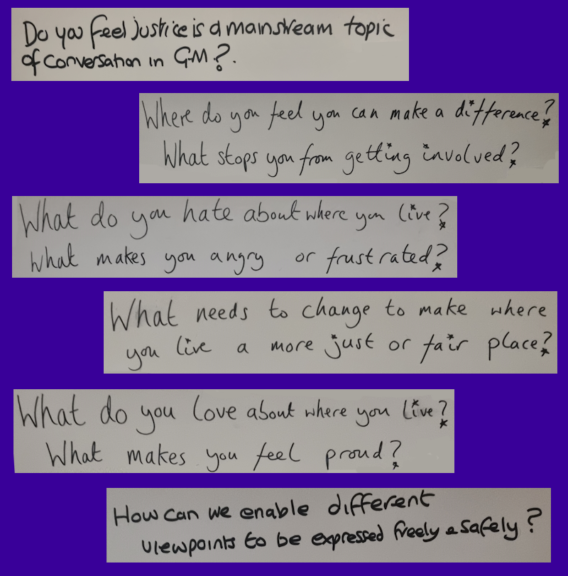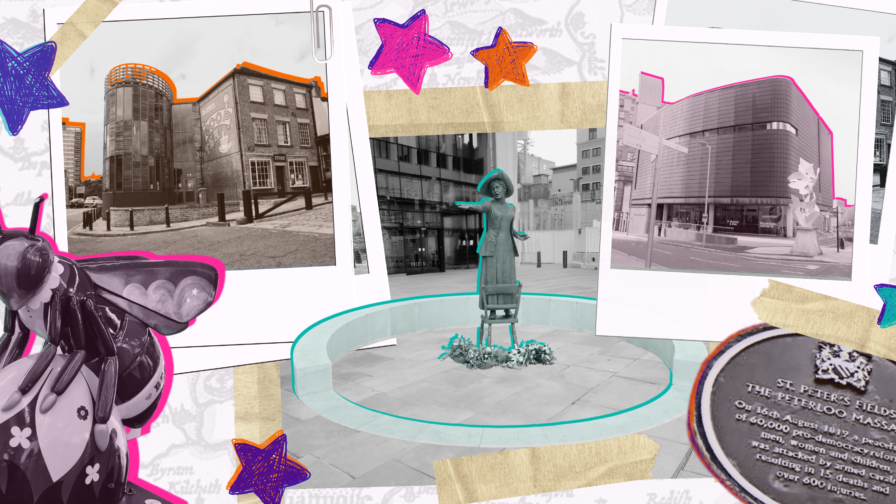When we asked people across Greater Manchester what justice means to them earlier this year, the area’s history came up repeatedly.
From “Manchester’s radical history”, to the Chartist movement, to institutions like the People’s History Museum and the Manchester Bee, many of those we asked about justice in the city region looked back to the past in their answers.
There was clear pride there, as well as frustrations.
Many of the answers we received gave us glimpses of a story we could pursue from many angles, but we needed a way of gathering all those separate perspectives into an enquiry we could use to unlock the most fruitful answers.
What if everyone felt included in understanding and celebrating Greater Manchester’s diverse heritage?
Heritage is a precious asset for communities in Greater Manchester, which holds its own shared history as well as the individual histories of the different communities that call it home. Despite this, there is a rich plurality of heritage that could be valued more.
It’s possible that heritage can be a route to making Greater Manchester a more just place, where communities are stronger and more connected with each other through pride in their local history, and that fostering greater understanding and exchange between communities can enable us to confront injustice.
We can uncover the untold stories of our communities, resist the misrepresentation of narratives and celebrate the shared histories that connect people across differences.
A conversation we had with Jenny, while she was working at the Rochdale Pioneers Museum one Saturday, captured much of the sentiment expressed by participants in our ‘A Just Greater Manchester’ project, where we visited each of the 10 GM boroughs and gathered responses in person and online on what they thought about justice in Greater Manchester.
“I’m super proud of being from the Manchester area. I’m proud of our heritage, especially since I’ve started working here, and of our working class movements.”
But for Jenny, this proud history is not being reflected in Greater Manchester’s current direction of travel.
“There needs to be a real drive to recognise that it was working classes that built Manchester. You can’t just create this new society based around luxury homes and big housing estates that no average normal person could ever afford, and just push people out.”
Jenny went on to talk about the social mix Greater Manchester is home to, from families who have lived here for generations, to waves of immigration we have seen over the years – “all the people that built this city, and that would still contribute so much”, if they were not being priced out.

Dez, who lives in Prestwich and performed his poetry at a recent Meteor event, also highlighted GM’s political history when we asked him about justice in the city region.
“I think the topic of standing out, and being brave and bold to try new things, is something Mancunians are proud of – just look at our rich history.”
Dez pointed to Emmeline Pankhurst as an example of this, and made a suggestion:
“Maybe we should have more statues and monuments up across the city to celebrate success through local change and transformation, to help people keep justice in their minds.”
Around the time we were hearing these ideas about heritage, we learnt about the concept of Generative Journalism and thought it would be a good way to dig deeper into the topic.
Pioneered by Axiom News in the United States, the Generative Journalism method has recently been used by Now Then magazine in Sheffield to explore the possibilities of agency in the workplace and the future rights of nature. It’s a great process to follow if you want to make a start on the big questions like ‘What if we could respond inclusively and effectively to planetary-scale problems?’
What is Generative Journalism?
The Generative Journalism process first involves setting a ‘calling question’ and declaration of possibility (see orange box above), which broaden the question and provide cues for the type of revealing responses we are looking for.
Next, a set of ‘provocative questions’ are created to ask interviewees. Unlike traditional interview methods, the responses are published with minimal editing, and the questions are written in a way that enables a more unrestricted and flowing answer. The point of ‘generative’ inquiry in this process is to ask the questions bearing in mind what already exists. The replies should build upon existing positives and consider what we can do next to generate change and move the discussion forward.
We will share the provocative questions (there would normally be up to 10 for each enquiry) with those who agree to take part.
Why Generative Journalism?
Generative Journalism “illuminates stories about things you’d like to see more of in the world”, and brings out people’s gifts and wishes. In doing so, it creates opportunities for new ideas, connections and actions to occur as a result of the content that is being produced and shared.
The hope is that by illuminating these stories, we might prompt some new ideas, connections and actions around some of the issues we identified in ‘A Just GM’, and give those close to these issues greater agency in our stories than we might have if following conventional journalistic practices.
Who we want to connect with
If you’d like to be a part of this new approach to journalism, get in touch! We’re looking for people to interview and to help us conduct interviews.
You might be working on a heritage project, or have an idea for one. Maybe you’re part of a group with a stake in the area’s history, or you’re an individual with a unique story.
Perhaps you’re just interested in this project and value our local heritage – we want to hear from you too.
If this sounds like you, we’d love to connect!
Email us at editor@themeteor.org with a few lines about who you are and why you’d like to take part.
Sign up to The Meteor mailing list – click here
The Meteor is a media co-operative on a mission to democratise the media in Manchester. To find out more – click here
Featured image: The Power Hall cc-by-sa/2.0 – © David Dixon – geograph.org.uk/p/3025965


Leave a Reply